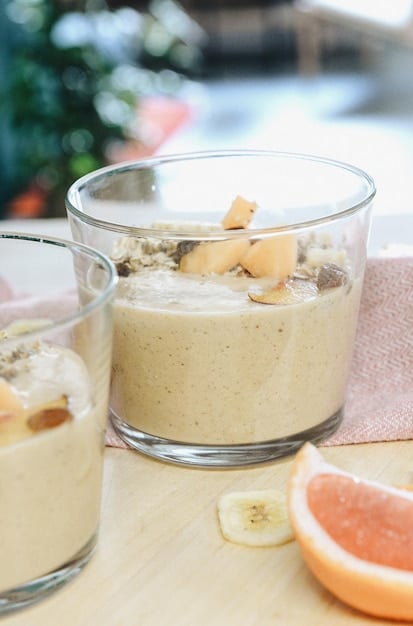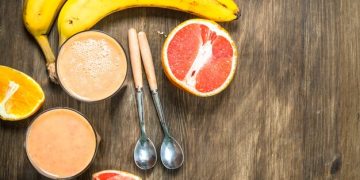Optimize Your Workouts with This 3-Day Pre-Workout Nutrition Plan

Mastering pre-workout nutrition is crucial for maximizing performance, accelerating recovery, and achieving fitness goals, requiring a strategic intake of macronutrients and micronutrients before exercise to fuel the body efficiently.
Unlocking peak athletic performance and optimizing recovery often hinges on a crucial, yet frequently underestimated, element: strategic pre-workout nutrition. This comprehensive guide, focusing on Pre-Workout Nutrition: Maximize Your Gains with This 3-Day Meal Plan, delves into the science and practical application of fueling your body for success.
The Science of Pre-Workout Fueling: Why It Matters
The food consumed before a workout acts as the foundation for your body’s energy demands during physical activity. Understanding the metabolic processes involved is key to appreciating why specific nutrient timing and composition are so critical for performance and results.
When you exercise, your body primarily relies on two main fuel sources: carbohydrates and fats. Carbohydrates are broken down into glucose, which is then stored as glycogen in your muscles and liver. This glycogen is the body’s preferred and most readily available energy source for high-intensity activities. Sufficient glycogen stores ensure you have the stamina and power to push through challenging workouts.
Glycogen Stores and Exercise Performance
Adequate glycogen levels are directly linked to sustained energy and endurance. Without proper pre-workout carbohydrate intake, your body may deplete its glycogen stores prematurely, leading to fatigue, reduced performance, and the potential for muscle breakdown as the body seeks alternative energy sources.
- Prevents premature fatigue.
- Enhances sustained energy output.
- Supports higher intensity and volume training.
- Reduces risk of muscle catabolism.
Fats also play a vital role, especially during longer, lower-intensity activities where they become a primary fuel. Protein, while not a direct energy source, is crucial for muscle repair and growth, and consuming a small amount before a workout can help minimize muscle damage and kickstart the recovery process.
Moreover, hydration and electrolyte balance are integral components of pre-workout preparation. Dehydration, even mild, can significantly impair performance, leading to cramping, fatigue, and reduced endurance. Electrolytes like sodium, potassium, and magnesium are vital for nerve function, muscle contractions, and fluid balance.
The timing of your pre-workout meal also influences its effectiveness. Consuming a large meal immediately before exercise can lead to digestive discomfort and divert blood flow from muscles to the digestive system. Conversely, waiting too long can result in depleted energy levels. A balanced approach ensures optimal nutrient absorption and energy availability precisely when needed.
Key Macronutrients for Peak Performance
To truly maximize your workouts, a strategic combination of macronutrients is essential. Each plays a distinct role in fueling your body, enhancing performance, and kickstarting recovery, forming the bedrock of any effective pre-workout nutrition plan.
Carbohydrates: The Primary Energy Source
Carbohydrates are your body’s preferred fuel source, especially for moderate to high-intensity exercise. Think of them as the immediate gasoline for your engine. They are broken down into glucose, which is then stored as glycogen in your muscles and liver. These glycogen stores are critical for sustained energy during your workout.
- Complex Carbohydrates: Oats, whole-grain bread, brown rice, sweet potatoes. These provide a steady release of glucose, ensuring sustained energy and preventing blood sugar crashes.
- Simple Carbohydrates (closer to workout): Bananas, fruit juice, dried fruit. These offer a quick energy boost, ideal for consumption 30-60 minutes before training.
Consuming an adequate amount of carbohydrates before your workout ensures that your muscles have readily available energy, allowing you to train harder, longer, and with more intensity. This, in turn, translates to improved performance and better training adaptations.
Proteins: Muscle Protection and Repair
While not a primary energy source during exercise, protein plays a crucial role in preventing muscle breakdown (catabolism) during strenuous activity and initiating the repair and growth process. A small amount of protein pre-workout can significantly impact recovery and adaptation.
Sources include lean meats, poultry, fish, eggs, dairy, or plant-based options like tofu and legumes. Opt for easily digestible proteins to avoid digestive discomfort during your workout. Pairing protein with carbohydrates creates a synergistic effect, promoting better muscle retention and faster recovery.
Fats: Sustained Energy for Longer Sessions
Fats are an essential energy source, particularly for longer, lower-intensity workouts. They provide more than double the energy per gram compared to carbohydrates or proteins. However, due to their slower digestion rate, they should be consumed in moderation and well in advance of your workout to avoid digestive issues.
Healthy fat sources include avocados, nuts, seeds, and olive oil. Incorporating a small amount of healthy fats into your pre-workout meal, especially if consumed two to three hours before exercise, can contribute to overall energy balance and satiety, without hindering immediate performance.
Achieving the right balance of these macronutrients is an art. It depends on the individual’s body type, the intensity and duration of the planned workout, and personal preferences. Experimentation is key to finding what works best for you, always prioritizing easily digestible options to avoid any discomfort during exercise.

Timing is Everything: When to Eat for Optimal Performance
The timing of your pre-workout meal is just as critical as its nutritional content. Consuming nutrients at the right time ensures they are properly digested and available to your muscles when needed, preventing discomfort and maximizing energy availability during your training session.
2-3 Hours Before Workout: Balanced Meal
This is the ideal window for consuming a substantial, balanced meal. At this point, your digestive system has ample time to process nutrients, making energy readily available without causing any discomfort during your workout. Such a meal should be rich in complex carbohydrates, moderate in lean protein, and low in fat and fiber to facilitate digestion.
Examples include:
- Oatmeal with berries and a scoop of protein powder.
- Grilled chicken with sweet potato and a side of steamed vegetables.
- Whole-wheat pasta with lean turkey mince and a light tomato sauce.
This approach allows for optimal glycogen replenishment and ensures a steady supply of amino acids for muscle support, setting a strong foundation for a productive workout. The goal is to provide sustained energy release without weighing you down.
1 Hour Before Workout: Smaller, Easily Digestible Snack
If your schedule doesn’t permit a full meal two to three hours out, a smaller, more easily digestible snack approximately an hour before your workout can still provide a necessary energy boost. The focus here is on quick-absorbing carbohydrates and a minimal amount of protein.
Consider options such as:
- A banana or an apple.
- A small handful of dried fruit (e.g., dates, raisins).
- A slice of whole-grain toast with a thin layer of jam.
These choices provide a rapid influx of glucose to top off muscle glycogen stores without taxing your digestive system. Avoid anything high in fat or fiber, as they can slow digestion and potentially lead to stomach upset during exercise.
30 Minutes Before Workout: Quick Energy Boost
For those needing a very quick energy boost right before heading into the gym, focus on simple carbohydrates that provide immediate fuel. This is not the time for complex meals or anything that requires significant digestion.
Good choices include:
- A small piece of fruit like an orange or a small banana.
- A small amount of fruit juice.
- A single rice cake.
The aim is to give your body a readily available source of glucose for immediate use. This strategy is particularly useful for morning workouts when a larger meal might not be feasible, or as a top-up for very intense sessions.
Ultimately, individual tolerance and the type of exercise planned will dictate the best timing. Experimentation and listening to your body’s signals are crucial to perfecting your pre-workout nutrition strategy.
Hydration and Electrolytes: The Unsung Heroes
Often overlooked in the discussion of pre-workout nutrition, adequate hydration and proper electrolyte balance are fundamental to maximizing performance and preventing early fatigue or adverse health effects during exercise. Water and electrolytes work in tandem to support virtually every physiological process in your body.
The Importance of Water Intake
Water is essential for maintaining blood volume, regulating body temperature, and transporting nutrients and oxygen to working muscles. Even mild dehydration can significantly impair physical performance, leading to:
- Reduced endurance and strength.
- Increased perceived exertion.
- Heat-related illness (cramps, heat exhaustion, heatstroke).
- Cognitive impairment and poor decision-making.
It is recommended to start hydrating well before your workout, not just immediately beforehand. Drinking several glasses of water throughout the day, especially in the hours leading up to exercise, helps ensure your body is adequately prepared. Aim for 500-600 ml (17-20 fl oz) of water 2-3 hours before a workout and another 200-300 ml (7-10 fl oz) 10-20 minutes beforehand.
Electrolytes: Crucial for Function
Electrolytes are minerals that carry an electric charge when dissolved in body fluids, such as sweat and blood. They are vital for numerous bodily functions, including nerve impulse transmission, muscle contraction, and maintaining fluid balance. Key electrolytes include:
- Sodium: Crucial for maintaining fluid balance and preventing cramping.
- Potassium: Important for muscle contraction and nerve signals.
- Magnesium: Involved in over 300 biochemical reactions, including muscle and nerve function, blood glucose control, and blood pressure regulation.
During exercise, especially intense or prolonged sessions, electrolytes are primarily lost through sweat. Replacing them is crucial, particularly if you are a heavy sweater or training in hot and humid conditions. While most people can replenish electrolytes through a balanced diet, sports drinks (with caution due to sugar content) or electrolyte supplements might be beneficial for extended workouts (over 60 minutes) or highly active individuals.
Foods rich in electrolytes include bananas (potassium), leafy greens (magnesium), and even a pinch of salt on your pre-workout meal (sodium). Prioritizing both water and electrolyte intake ensures your body’s systems are fully operational, ready to perform at their peak and recover efficiently.
3-Day Pre-Workout Meal Plan: Practical Application
Translating theoretical knowledge into practical application can be challenging. This 3-day meal plan provides concrete examples of pre-workout nutrition strategies tailored for different timings and intensities, designed to maximize your energy, performance, and recovery. Remember, portion sizes should be adjusted based on individual needs, workout intensity, and body composition goals.
This plan emphasizes balance, digestibility, and provides a range of options, allowing for flexibility and personalization. It avoids overly complex recipes, focusing on readily available and easy-to-prepare ingredients to fit into a busy lifestyle.
Day 1: High-Intensity Training Focus (3 Hours Before)
This day’s plan is geared towards providing sustained energy for demanding workouts like strength training or HIIT, where both complex carbohydrates and quality protein are paramount.
- Meal: 1 cup cooked quinoa with 4-5oz grilled chicken breast, 1/2 cup steamed broccoli, and a drizzle of olive oil.
- Why it works: Quinoa provides complex carbs for sustained energy, chicken offers lean protein for muscle support, and broccoli adds essential micronutrients with minimal fiber, aiding digestion.
- Hydration: 20oz water with a pinch of sea salt.
This combination ensures a slow release of glucose into the bloodstream, preventing energy crashes while providing the necessary amino acids for muscle protection and repair without causing digestive distress during intense exercise.
Day 2: Endurance Workout Focus (1-1.5 Hours Before)
Tailored for longer, moderate-intensity cardio sessions, this plan prioritizes easily digestible carbohydrates for quick energy, coupled with a small amount of protein to prevent muscle catabolism.
- Meal: 1 medium banana mashed with 1/2 cup rolled oats (cooked with water) and 1 tablespoon almond butter.
- Why it works: Banana and oats offer simple and complex carbs for immediate and sustained energy, while almond butter provides healthy fats and a touch of protein to curb hunger.
- Hydration: 15oz water.
This meal strikes a balance between providing readily available energy and being light enough to prevent stomach upset during continuous movement. The soluble fiber in oats also helps regulate blood sugar.
Day 3: Quick Energy Boost/Early Morning Session (30-45 Minutes Before)
Ideal for early morning workouts or when time is limited, this option focuses on very rapid energy delivery with minimal digestive burden.
- Meal: 1 slice whole-grain toast with 1/4 avocado and a sprinkle of chili flakes (optional for flavor/metabolism boost).
- Why it works: Whole-grain toast offers quick-acting carbs, while avocado provides healthy fats for satiation and sustained energy.
- Hydration: 10oz water.
This combination ensures immediate energy without any heavy feeling, perfect for those who prefer to train on a lighter stomach or have a short window before exercising. The avocado also provides healthy monounsaturated fats.
Remember to listen to your body and adjust portion sizes and food choices based on how you feel during your workouts. The goal is to find what fuels you best for optimal performance.
Common Mistakes and How to Avoid Them
Navigating the world of pre-workout nutrition can be tricky, and even seasoned athletes can fall prey to common pitfalls. Identifying and avoiding these mistakes is crucial for optimizing your performance, preventing discomfort, and ensuring your efforts in the gym yield maximum results.
Eating Too Close to Your Workout
One of the most frequent mistakes is consuming a large meal too close to the start of your training session. This often leads to:
- Digestive discomfort, cramping, or nausea during exercise.
- Reduced blood flow to working muscles as the body diverts resources to digestion.
- Feeling sluggish or heavy, impairing performance.
Solution: Plan your meals. Aim for a substantial meal 2-3 hours before, a lighter snack 1 hour before, and only simple, quickly digestible carbohydrates if you have less than 30 minutes. Listen to your body and adjust timing based on your unique digestive speed and the intensity of your planned workout.
Ignoring Hydration and Electrolytes
Focusing solely on food intake while neglecting water and electrolyte balance is another common oversight. Dehydration, even mild, can severely impair performance, leading to fatigue, reduced strength, and an increased risk of cramping or heat-related issues.
Solution: Prioritize consistent hydration throughout the day, not just before your workout. Drink water steadily, and for longer or more intense sessions, consider incorporating electrolyte-rich foods or a balanced electrolyte drink. The goal is to be well-hydrated before you even start sweating.
Over-Reliance on Supplements
While pre-workout supplements can offer benefits, many individuals incorrectly view them as a substitute for proper nutrition. No supplement, no matter how advanced, can compensate for a poor diet. Relying solely on supplements can lead to nutrient deficiencies and suboptimal performance in the long run.
Solution: Use supplements judiciously and as an adjunct to a well-balanced diet. Focus on whole, unprocessed foods as the foundation of your pre-workout nutrition. Consult with a nutritionist or healthcare professional to determine if specific supplements are genuinely necessary for your goals.
Excessive Fiber or Fat Pre-Workout
Foods high in fiber and fat, while generally healthy, can be problematic immediately before a workout. They slow down digestion, potentially leading to gastrointestinal distress during exercise, bloating, or feeling overly full.
Solution: Opt for low-fiber, low-fat options in your immediate pre-workout meals and snacks. While healthy fats and fiber are important overall, their timing matters. Save higher-fiber or higher-fat meals for earlier in the day or after your workout, allowing ample time for digestion.
By consciously avoiding these common pitfalls, you can ensure your pre-workout nutrition strategy is truly set up for success, leading to more productive workouts and faster progress towards your fitness goals.
Beyond the Plate: Lifestyle Factors for Maximizing Gains
While nutrition forms the cornerstone of pre-workout readiness, optimizing your gains extends beyond what you eat. Several lifestyle factors significantly influence your body’s ability to perform, recover, and effectively utilize the nutrients you consume. Addressing these holistically enhances the impact of your dietary strategies.
Adequate Sleep: The Foundation of Recovery
Often underestimated, sleep is arguably the most critical component for physical and mental recovery. During sleep, your body repairs muscle tissue, consolidates memories (aiding in learning new skills), and regulates hormones vital for performance, such as growth hormone and cortisol. Chronic sleep deprivation can:
- Impair cognitive function and decision-making.
- Reduce physical performance and endurance.
- Increase the risk of injury.
- Disrupt appetite-regulating hormones, potentially leading to poor food choices.
Action: Aim for 7-9 hours of quality sleep per night. Establish a consistent sleep schedule, create a dark, quiet, and cool sleep environment, and avoid screens before bedtime.
Stress Management: Mitigating Cortisol Impact
Chronic stress triggers the release of cortisol, a hormone that, in excess, can promote muscle breakdown, hinder recovery, and even contribute to fat storage. High stress levels can also impact digestion and nutrient absorption, counteracting meticulous pre-workout meal planning.
Action: Incorporate stress-reducing practices into your daily routine. This could include meditation, yoga, deep breathing exercises, spending time in nature, or engaging in hobbies you enjoy. Finding healthy outlets for stress is crucial for maintaining a balanced physiological state.
Consistency and Adaptability: Long-Term Success
No single meal plan or supplement will deliver results if not applied consistently. Building a routine around your pre-workout nutrition and lifestyle factors ensures long-term progress. However, it’s equally important to remain adaptable.
Your body’s needs change with training phases, stress levels, and even daily fluctuations. What works perfectly on one day might not feel right on another. Being consistent means adhering to principles, but adaptability means listening to your body’s signals and making minor adjustments as needed.
Action: Keep a journal to track how different pre-workout meals and lifestyle choices affect your energy levels and performance. This data helps you refine your strategy over time, ensuring it continues to serve your evolving needs. Rome wasn’t built in a day, and neither is peak athletic performance – it’s a cumulative effort of consistent, smart choices across all facets of your lifestyle.
| Key Point | Brief Description |
|---|---|
| 🚀 Macronutrient Balance | Carbs for energy, protein for repair, fats for sustained fuel. |
| ⏰ Timing is Crucial | Adjust meals based on time before workout for optimal digestion. |
| 💧 Hydration & Electrolytes | Essential for performance, temperature regulation, and muscle function. |
| 🚫 Avoid Common Mistakes | Don’t eat too close, over-rely on supplements, or ignore water. |
Frequently Asked Questions
▼
Ideally, consume a balanced meal 2-3 hours prior to your workout. If time is short, a smaller, easily digestible snack 30-60 minutes before is effective. This optimizes digestion and nutrient absorption, ensuring energy is readily available without causing discomfort during exercise.
▼
Complex carbohydrates like oats, brown rice, or sweet potatoes are excellent 2-3 hours out for sustained energy. Closer to the workout (30-60 minutes), opt for simple carbs like bananas or fruit slices for a quick energy boost. These fuel muscle glycogen stores efficiently.
▼
While carbohydrates are the primary fuel, a small amount of lean protein pre-workout can minimize muscle breakdown during exercise and kickstart the recovery process. This helps preserve muscle tissue, especially during intense training sessions, aiding in overall muscle gain.
▼
Pre-workout supplements can offer benefits, but they should complement, not replace, proper whole-food nutrition. They often contain stimulants or specific compounds, but a balanced meal provides essential macronutrients and micronutrients that supplements alone cannot fully replicate for sustained performance and health.
▼
Hydration is critical. Drink sufficient water throughout the day, aiming for 17-20 fl oz 2-3 hours before your workout and another 7-10 fl oz 10-20 minutes beforehand. This maintains blood volume, regulates body temperature, and transports nutrients, significantly impacting exercise performance and preventing fatigue or cramps.
Conclusion
Optimizing pre-workout nutrition is more than just eating; it’s a strategic approach to fueling your body for peak performance, accelerated recovery, and long-term fitness gains. By understanding the critical roles of macronutrients, timing your meals effectively, and prioritizing hydration, you empower your body to push harder and recover smarter. The 3-day meal plan serves as a practical blueprint, yet the cornerstone of success remains consistency, adaptability, and listening to your body’s unique signals. Integrating these nutritional strategies with a holistic focus on sleep and stress management creates a powerful synergy, transforming your efforts in the gym into tangible, lasting results.





